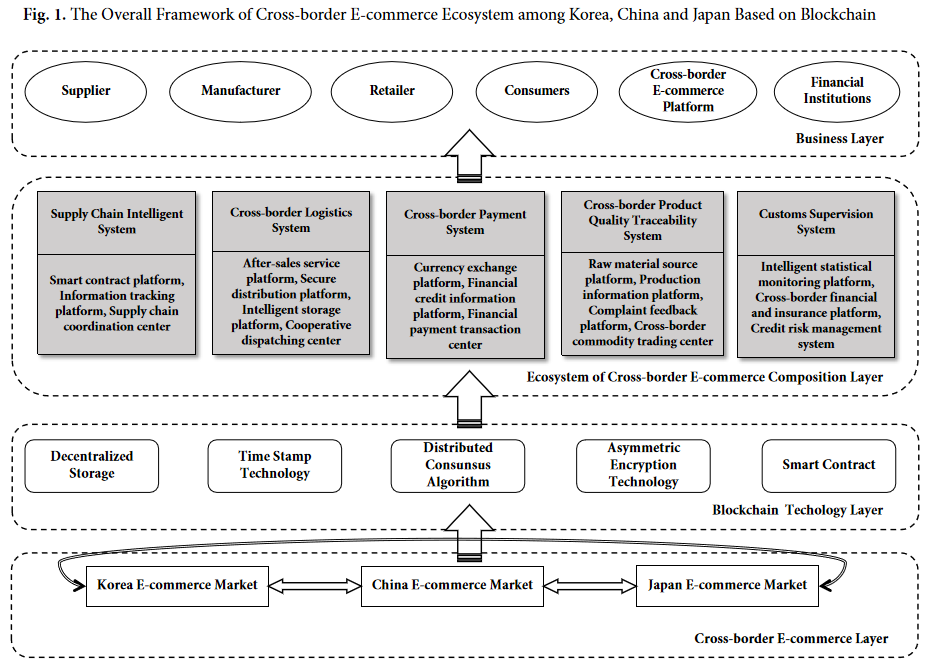
Shen Xiangdong, Lecturer, from the School of Business recently published the title "The New Ecosystem of Cross-border E-Commerce among Korea, China and Japan Based on Blockchain" in the internationally renowned journal "Journal of Korea Trade" (Area of SSCI Division, Chinese Academy of Sciences) with the first author and Changshu Institute of Technology as the first completion unit. This study combined with the problems existing in cross-border e-commerce among Korea, China and Japan, and proposes a solution based on blockchain. On this basis, it constructs a cross-border e-commerce ecosystem among these three countries, including cross-border supply chain intelligent system, cross-border logistics system, cross-border payment system, cross-border product quality traceability system and cross-border customs supervision system. In addition, we discuss the main problems existing in the current blockchain, such as low transaction concurrency, security loopholes, and inconsistent standards, the corresponding countermeasures are proposed from the technical level, security level and industry standards.
Thesis link: http://ktra.ccpshost.com/h_board/view.php?&bbs_id=e12&page=&doc_num=112&PHPSESSID=058b8b510cff6b892b43027ed5fbbb6c
Paper Title:The New Ecosystem of Cross-border E-Commerce among Korea, China and Japan Based on Blockchain
Journal:Journal of Korea Trade
Abstract
Purpose – The purpose of the study is to propose a theoretical framework of cross-border e-commerce ecosystems based on blockchain technology. The ecosystem includes five systems, namely, cross-border supply chain intelligent system, cross-border logistics system, cross-border payment system, cross-border product quality traceability system and cross-border customs supervision system.
Design/methodology – This study firstly derived the main improvement factors for the new ecosystem based on blockchain through prior research and expert interviews on cross-border e-commerce. Then explored the use of virtue of decentralization, anti-counterfeiting traceability, consensus mechanism, smart contract and other means of the core technology of blockchain to overcome the bottleneck of cross-border e-commerce development among Korea, China, and Japan. Finally, proposed valuable
implications in both theoretical and practical perspectives.
Findings – As a result, we combined with the problems existing in cross-border e-commerce among Korea, China and Japan, this paper proposes a solution based on blockchain. On this basis, it constructs a cross-border e-commerce ecosystem among these three countries, including five systems. In addition, we discuss the main problems existing in the current blockchain, such as low transaction concurrency, security loopholes, and inconsistent standards, the corresponding countermeasures are
proposed from the technical level, security level and industry standards.
Originality/value – This study is the first to apply the blockchain technology to solve the cross-border e-commerce problems in Korea, China and Japan, which is of pioneering significance in both literature and practice. Block chain technology is in the ascendency. This study provides technical solutions for promoting the development of cross-border e-commerce import and export trade between Korea,
China and Japan.

Figure 1. In this framework, blockchain technology is built in the bottom of the five systems, with the help of blockchain technology franchise to support the five systems to work together. The cross-border e-commerce supply chain system needs to establish data information connection with cross-border payment system, cross-border logistics system, cross-border product quality traceability system and cross-border customs supervision through the blockchain basic data storage platform, so as to promote the transformation and upgrading of cross-border e-commerce system among Korea, China and Japan.

Xiangdong Shen is an lecturer in Deapartment of Business School, Changshu Institute of Technology. He received his PhD degree in 2019 from Jeonbuk National University (South Korea). His current research interests focus on the corporate social responsibility (CSR), brand management and consumer behavior. He has published many papers in international authoritative journals.
